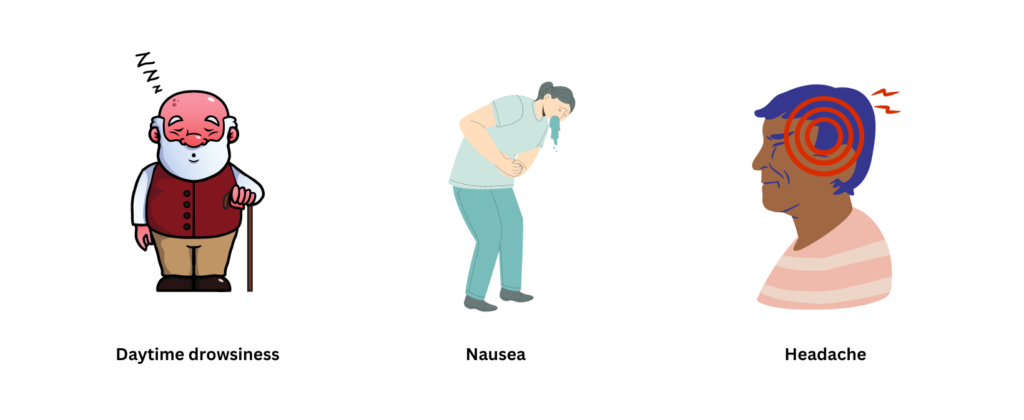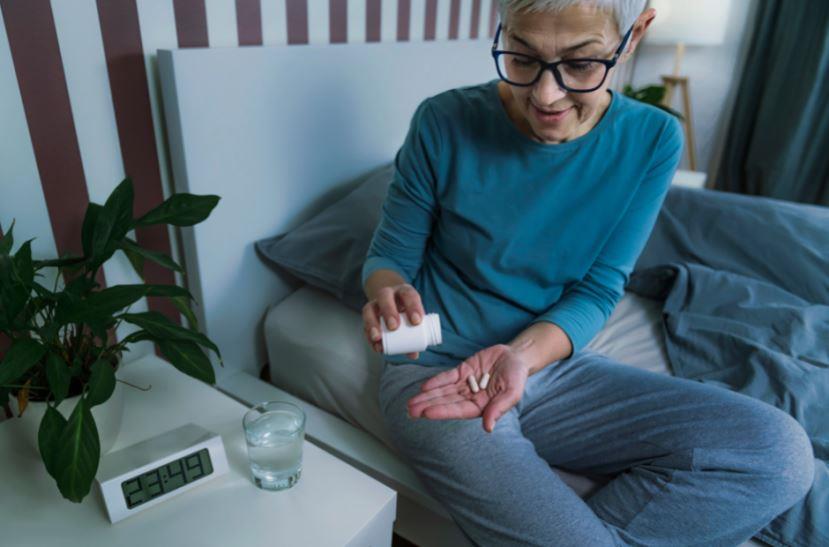Did you know that almost 70 million people in the USA have insomnia? Studies show that the prevalence of this disorder is more common in the older population than in the younger ones. As people age, their sleep patterns naturally change. It can result in insomnia, restless nights, and other sleep-related issues. Melatonin supplements have been shown to be a helpful remedy for some of these problems in the elderly population. However, melatonin does have some potential side effects, which should be considered before taking it. In this blog, we will discuss 7 common and occasional side effects of melatonin on the elderly so that they can better prepare for these adversities.
What is Melatonin?
Melatonin is a hormone generated by the pineal gland in the brain, and it helps regulate the body’s sleep-wake cycle. These hormones can respond to darkness and helps with your circadian rhythms (24-hour internal clock). Sometimes, melatonin supplements are used to treat insomnia and other sleep disorders in people of all ages. It may help to boost the amount of melatonin in the body, improving sleep quality and lessening fatigue. However, there are some concerns that it may adversely affect the elderly.
Top 3 Benefits of Melatonin for the Elderly
There are many benefits of melatonin for the elderly. Here are the top 3 benefits of taking the supplements:
1. Help with Delayed sleep-wake phase disorder (DSWPD)
Some studies suggest melatonin can help regulate the body’s natural sleep rhythm. So, for people with delayed sleep-wake phase disorder, taking melatonin before bed can help encourage sleepiness and the body to start winding down for bed. That means it may help to restore the natural sleep-wake cycle, making it easier to fall and stay asleep throughout the night.
2. Reduce inflammation
Melatonin also has anti-inflammatory properties and can help to reduce inflammation in the body. The hormone also reduces oxidative stress, which is one of the major contributors to inflammation. Another way melatonin helps reduce inflammation is by inhibiting the production of inflammatory cytokines – a major contributor to chronic and acute inflammation.
3. Improve mood and cognitive function
As people age, their melatonin production decreases. It can lead to sleep problems and a decreased quality of life. Supplementing with melatonin may help improve daytime functioning, energy levels and reduce the risk of falls in the elderly. Additionally, melatonin may improve mood, cognitive function, and reduce anxiety.
10 Side Effects of Melatonin on the Elderly
While melatonin is generally considered safe, there are a few potential side effects to be aware of when taking it. We will now discuss the 7 common and occasional side effects of melatonin in elderly.
Common Side Effects
Let’s check out some of the most common melatonin side effects in elderly:
1. Daytime drowsiness
Melatonin may cause daytime drowsiness, making it difficult for seniors to stay alert and focused during the day. This side effect is more likely to crop up when melatonin is taken close to bedtime. It can lead to issues with completing everyday tasks and can also increase the risk of falls and other accidents.
2. Nausea
Nausea is a potential side effect of melatonin in the elderly. It can be accompanied by vomiting, stomach cramps, and an overall feeling of sickness. Sometimes, it can be severe enough to cause dehydration in seniors. If nausea is acute or persistent, consult a doctor to find out if there is another underlying cause and find alternatives.
3. Headache
Headache is one of the most common side effects of melatonin in the elderly. This side effect is often reported by people who take melatonin for the first time, and it tends to go away with repeated use. Headaches may also be a sign that too much melatonin is being taken, so it is essential to monitor how much is being consumed.

Melatonin side effects in elderly
Occasional Side Effects
Now let’s explore some of the occasional or not-so-common side effects of melatonin on the elderly:
1. Short-term depression
Some people who take melatonin may feel down or depressed for a short period of time after taking the supplement. Additionally, melatonin can cause weakness and confusion, which may trigger depression in elderly patients. It can also disrupt the body’s natural rhythms, leading to feelings of depression.
2. Irritability
Some older adults who take melatonin supplements experience irritability and restlessness. This can manifest itself in several ways, such as mood swings, feeling easily frustrated, or becoming angry more quickly than usual. Additionally, melatonin can interact with other medications a person takes, which may also lead to increased irritability.
3. Diarrhea
Diarrhea is another potential side effect of melatonin. For most people, this is a mild side effect that goes away within a few days. However, for some individuals, it can be a more long-lasting issue. In such cases, it is recommended to consult your doctor or healthcare provider to lower the dose or stop taking the supplements altogether.
4. Nightmares
Though not everyone, some people may experience nightmares or vivid dreams after taking melatonin. That is because melatonin can cause changes in brain activity, leading to increased REM sleep that causes vivid dreams. However, these nightmares can be caused by many factors, such as anxiety, stress, or medications.
Long-term side effects of Melatonin on older adults
There is limited research on the long-term side effects of melatonin, specifically in seniors. But here are a few considerations:
1. Cognitive effects
Some studies suggest that long-term melatonin use in older adults may have cognitive effects, such as impairments in memory and attention. However, more research is needed to fully understand these potential effects.
2. Interaction with medications
Melatonin can interact with certain medications, including blood thinners, sedatives, and anticoagulants. It is important for seniors to check with their healthcare provider or pharmacist about possible interactions with their specific medications.
3. Hormonal effects
Prolonged melatonin use may affect the innate production of melatonin in the body, leading to a decline in endogenous melatonin production. However, this effect’s extent and clinical significance need to be well-established.
Guide for Taking Melatonin for the Elderly
If you are elderly and considering taking melatonin supplements, you should keep a few things in mind.
- First, it is vital to discuss with your doctor before starting any new supplement. They can assist you in finding the right dose and determine if there are any potential interactions with other medications you are taking.
- Second, start with a low dose of melatonin and increase it gradually as needed.
- Third, if you decide to start taking melatonin, follow the dosage instructions carefully, as too much can cause adverse effects.
- Fourth, avoid taking melatonin close to bedtime, as it requires some time to kick in and can interfere with sleep. Try taking it about two hours before you plan to go to bed.
- Finally, try to stick to a routine when taking melatonin, as this can help ensure the best results.
Final Thoughts
While melatonin is often considered a natural sleep aid with few side effects, the elderly population should be aware of potential consequences before taking this supplement. The side effects can range from headaches and dizziness to more serious problems such as diarrhea and short-term depression. If you are an older adult considering using melatonin to improve your sleep quality, please speak with your doctor first to ensure it is the right choice for you. We hope this article has helped shed some light on an oftentimes forgotten topic – elderly health. You may also take a look at some of our related articles about elderly health and well-being:
- Sleep Changes as We Age: Sleep Hygiene Tips
- Sundown Syndrome – Tips to Manage Sundowning in Seniors
- Prevent Falls in Dementia Patients: 7 Effective Tips
- 10 Ways to Protect Senior Mental Health
- Dehydration in Seniors: Signs, Risks and How to Avoid it
FAQs
Can the elderly take melatonin?
Yes, the elderly can take melatonin. However, they should speak with a health professional before starting any new supplements, as different people react differently to these dosages. Besides, melatonin may have some side effects as well. So, it is recommended to consult a doctor before taking it.
Is melatonin safe for the elderly?
Yes, melatonin is generally safe for the elderly. However, they might cause side effects like headaches, daytime sedation, nausea, etc. So, it is always good to consult a healthcare professional before starting any new medication or supplement.
Are there any long-term side effects of melatonin?
There is no evidence that melatonin has any long-term side effects. However, potential risks include daytime sleepiness, headache, and in some severe cases, diarrhea, vomiting, or seasonal depression.
Can melatonin cause diarrhea in elderly?
In some cases, melatonin can cause diarrhea in the elderly. Elderly people have reported adverse effects from melatonin, such as digestive issues like diarrhea, nausea, and stomach pain. So, it is important to speak with your doctor before taking any new supplement, especially if you are elderly.

